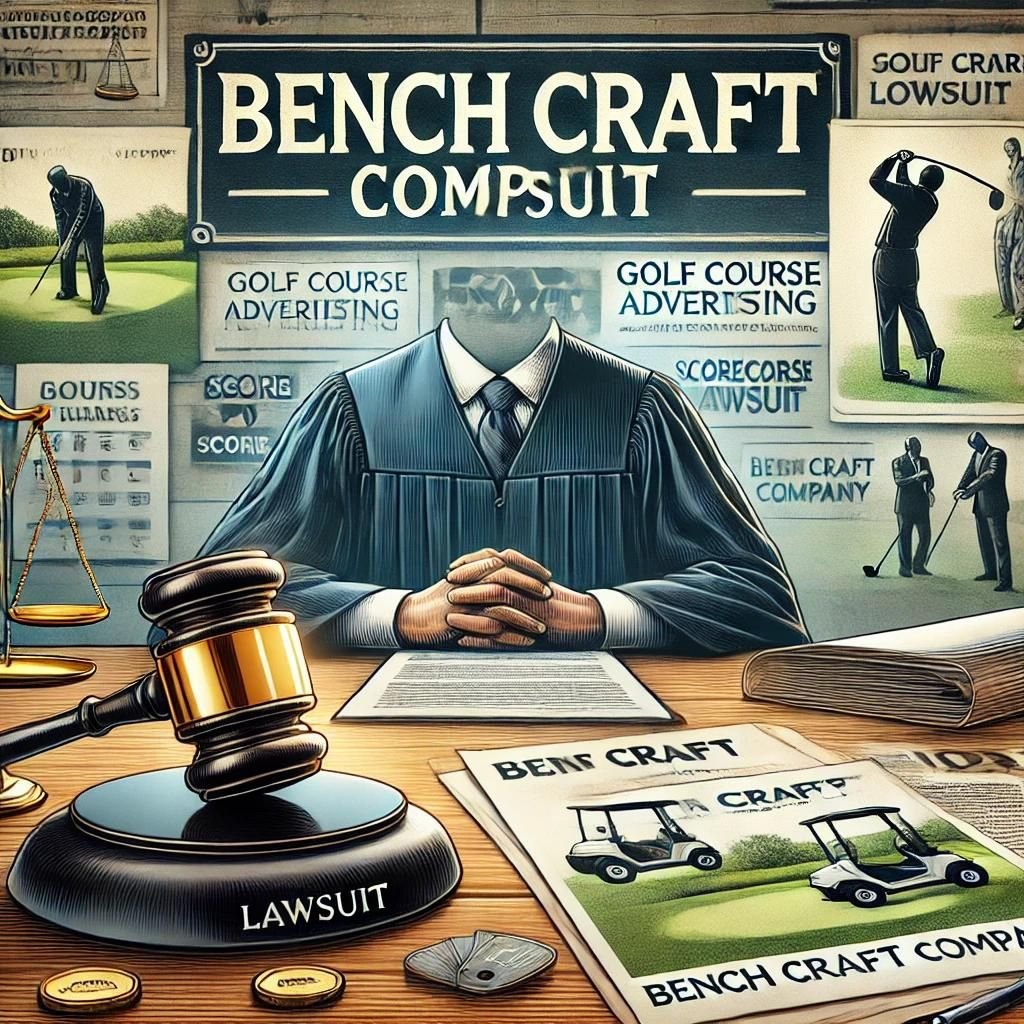Introduction
The Bench Craft Company lawsuit has been a topic of significant discussion within business and legal circles. Known for its specialization in golf course advertising, Bench Craft Company faced serious allegations of deceptive marketing strategies and unfair business practices. This article delves into the intricate details of the lawsuit, including the nature of the allegations, the progression of legal proceedings, and the potential ramifications for the company and the broader marketing industry.
Bench Craft Company Lawsuit: What is the Case?
For several years, the Bench Craft Company lawsuit has attracted notable attention. The legal battle centers around accusations that Bench Craft Company engaged in deceptive marketing strategies and unfair business practices. This company, renowned for its creative advertising materials like bench and tee box signs, scorecards, and yardage books, allegedly misled its clients, leading to widespread legal action.
Bench Craft Company: A Quick Brief
Founded in 1982, Bench Craft Company established itself as a leading name in marketing and advertising, particularly in the niche of golf course guides and promotional materials. Their unique business model attracted many business enthusiasts, making them a prominent player in the industry.
Reasons, Concerns, and Allegations Leading to the Bench Craft Company Lawsuit
The lawsuit arose from rising concerns about Bench Craft Company’s business practices. Businesses that utilized the company’s services brought forward several allegations, forming the crux of the lawsuit. These allegations can be broadly categorized into three primary areas:
Misrepresentation of Advertising Reach
Plaintiffs contended that Bench Craft Company misrepresented the potential reach of their advertisements, leading businesses to invest based on exaggerated projections of audience engagement.
Failure to Deliver Promised Results
Some businesses asserted that they did not achieve the anticipated return on investment, indicating that Bench Craft Company failed to fulfill its commitments and deliver the promised results.
Unfair Contract Conditions
Allegations were also leveled against the contract terms offered by Bench Craft Company, with claims that the agreements heavily favored the company’s interests, often to the detriment of its clients.
The Process of the Bench Craft Company Lawsuit
The legal battle involving Bench Craft Company progressed through several stages, reflecting the complexity and seriousness of the allegations.
Class-Action Lawsuit
The lawsuit transitioned into a class-action lawsuit, a legal avenue wherein numerous plaintiffs with comparable claims unite in a singular legal action. This method is frequently employed when a substantial number of individuals are impacted by purportedly similar wrongdoing.
Bench Craft Company’s Defense
In response to the allegations, Bench Craft Company mounted a vigorous defense, asserting that its advertising services had indeed delivered value to its clients. They attributed any disparities in outcomes to market fluctuations and various external factors beyond their control.
Settlement Negotiations
As the legal proceedings continued, both parties attempted to settle the disagreement through discussions and negotiations. They explored potential compensation for the plaintiffs and possible changes Bench Craft Company could implement to address the issues.
Despite settlement attempts, the class-action lawsuit proceeded to court, culminating in a judicial decision. This decision set a precedent for similar cases in the future.
How the Bench Craft Company Lawsuit Progressed
The Bench Craft Company lawsuit followed a structured legal process, including several key stages.
Discovery and Injunction
During the discovery stage, both sides shared crucial information, evidence, and expert testimonies to build their cases. The plaintiffs sought to prove that Bench Craft Company engaged in deceptive practices, while the company defended itself against these claims.
The plaintiffs also sought an injunction to temporarily or permanently halt Bench Craft Company’s activities that could harm them further. This phase significantly influenced the court’s decisions and the lawsuit’s progression.
Emotional and Financial Impact
The lawsuit inflicted significant financial hardships on the plaintiffs, who had heavily invested in Bench Craft Company’s advertising services. These financial losses diminished their expected returns and caused profound emotional distress among affected golf course owners and local businesses.
The fallout from the lawsuit also cast doubt on Bench Craft Company’s integrity and reliability, tarnishing its reputation and potentially jeopardizing its future prospects. Beyond financial ramifications, the lawsuit eroded consumer trust within the advertising industry, prompting heightened scrutiny of ethical standards, transparency, and accountability.
Changes in Business Practices Post-Lawsuit
Following the Bench Craft Company lawsuit, businesses began reassessing their practices to avoid similar pitfalls. They emphasized ethical behavior, transparent communication, and responsible advertising practices to rebuild trust with customers and demonstrate their commitment to integrity.
Key Changes Implemented by Businesses
- More Honesty: Companies are now ensuring complete honesty about advertising reach and services offered, fostering greater trust and avoiding confusion.
- Easier Contracts: Businesses are simplifying contracts to be more understandable and fairer to customers, reducing the likelihood of disputes.
- Increased Accountability: Companies are implementing better systems to ensure accountability for their actions and service quality.
By making these changes, businesses aim to restore customer trust and show that they have learned from the Bench Craft Company lawsuit.
Industry Perspective
The Bench Craft Company lawsuit holds significant importance for the marketing and advertising industry. As a major player in a competitive field, the outcomes of this legal battle could impact market trends and influence how other businesses operate.
Emphasis on Transparency and Ethical Conduct
The lawsuit brought concerns about misleading practices to the forefront, emphasizing the need for companies to uphold industry standards to maintain client trust and stay competitive. Additionally, the case underscored the importance of accurately representing advertising reach and fulfilling promised services.
Wrapping Up the Bench Craft Company Lawsuit Story
The Bench Craft Company lawsuit serves as a clear reminder of the critical role of ethical business conduct and transparency in marketing endeavors. It highlights the risks associated with misleading advertising practices and their extensive impact on businesses.
As the legal proceedings conclude, the case continues to spark introspection across the industry. It underscores the importance of thorough research before engaging in business relationships and the necessity of providing accurate information about product or service benefits.
The aftermath of the Bench Craft Company lawsuit is poised to shape how companies approach advertising, sales, and partnerships in the foreseeable future. It serves as a cautionary tale of the potential legal, financial, and reputational repercussions when businesses stray from ethical norms.

